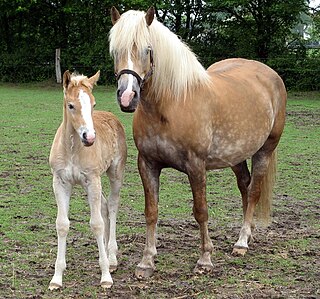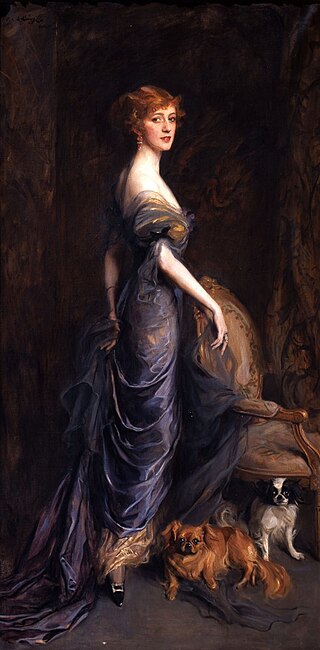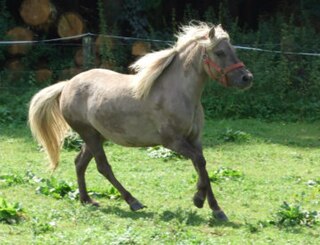
The Angora rabbit, one of the most ancient groups of domestic rabbit breeds, which is bred for the long fibers of its coat, known as Angora wool. They are gathered by shearing, combing or plucking. Because rabbits do not possess the same allergy-causing qualities as many other animals, their wool is an important alternative. There are at least 11 distinct breeds of Angora rabbit, four of which are currently recognized by the American Rabbit Breeders Association (ARBA): the English Angora, the French Angora, the Giant Angora and the Satin Angora. Other unrecognized breeds include the German Angora, the Finnish Angora, the Chinese Angora, the Japanese Angora, the Korean Angora, the Russian Angora, the St Lucian Angora and the Swiss Angora.

The Free German Trade Union Federation was the sole national trade union centre of the German Democratic Republic which existed from 1946 to 1990. As a mass organisation of the GDR, nominally representing all workers, the FDGB was a constituent member of the National Front. The leaders of the FDGB were also senior members of the ruling Socialist Unity Party of Germany (SED).
The Mainland Affairs Council (MAC) is a cabinet-level administrative agency under the Executive Yuan of the Republic of China (Taiwan). The MAC is responsible for the planning, development, and implementation of the Cross-Strait relations policy which targets mainland China, Hong Kong and Macau.
A breed registry, also known as a herdbook, studbook or register, in animal husbandry, the hobby of animal fancy, is an official list of animals within a specific breed whose parents are known. Animals are usually registered by their breeders while they are young. The terms studbook and register are also used to refer to lists of male animals "standing at stud", that is, those animals actively breeding, as opposed to every known specimen of that breed. Such registries usually issue certificates for each recorded animal, called a pedigree, pedigreed animal documentation, or most commonly, an animal's "papers". Registration papers may consist of a simple certificate or a listing of ancestors in the animal's background, sometimes with a chart showing the lineage.

The Haflinger, also known as the Avelignese, is a breed of horse developed in Austria and northern Italy during the late 19th century. Haflinger horses are relatively small, are always chestnut with flaxen mane and tail, have distinctive gaits described as energetic but smooth, and are well-muscled yet elegant. The breed traces its ancestry to the Middle Ages; several theories for its origin exist. Haflingers, developed for use in mountainous terrain, are known for their hardiness. Their current conformation and appearance are the result of infusions of bloodlines from Arabian and various European breeds into the original native Tyrolean ponies. The foundation sire, 249 Folie, was born in 1874; by 1904, the first breeders' cooperative was formed. All Haflingers can trace their lineage back to Folie through one of seven bloodlines. World Wars I and II, as well as the Great Depression, had a detrimental effect on the breed, and lower-quality animals were used at times to save the breed from extinction. During World War II, breeders focused on horses that were shorter and more draft-like, favored by the military for use as packhorses. The emphasis after the war shifted toward animals of increased refinement and height.

Matthias Platzeck is a German politician. He was Minister President of Brandenburg from 2002 to 2013 and party chairman of the SPD from November 2005 to April 2006.

The Deutsche Reichsbahn or DR(German Reich Railways) was the operating name of state owned railways in the East Germany, and after German reunification until 1 January 1994.

The Magpie is a British breed of domestic duck. It has distinctive black and white markings reminiscent of the European magpie, and is a good layer of large eggs.

Andreas Hermes was a German agricultural scientist and politician. In the Weimar Republic, he was a member of several governments, serving as minister of food/nutrition and minister of finance for the Catholic Zentrum. During the rule of the Nazi Party, Hermes was part of the right-wing resistance, for which he was imprisoned and sentenced to death, but never executed thanks to the intervention of his wife. After World War II, he co-founded the Christian Democratic Union.

General elections were held in East Germany on 18 March 1990. They were the first free elections in that part of Germany since 1932, and were the first and only free elections held in the state before German reunification. The Alliance for Germany, led by the new East German branch of the centre-right Christian Democratic Union (CDU), won 192 seats and emerged as the largest bloc in the 400-seat Volkskammer, having run on a platform of speedy reunification with West Germany. The East German branch of the Social Democratic Party (SPD), which had been forced to merge with the Communist Party of Germany (KPD) in 1946 and refounded only six months before the elections, finished second with 88 seats despite being widely expected to win. The former Socialist Unity Party of Germany, restyled as the Party of Democratic Socialism (PDS), finished third with 66 seats.

Animal fancy is a hobby involving the appreciation, promotion, or breeding of pet or domestic animals.

The Peasants Mutual Aid Association was an East German mass organization for peasants and farmers, later also gardeners. It was founded in the 1945–1946 period and was a participant in the National Front. From 1950 to 1963 and again in 1986, it had representation in the Volkskammer.

The Boerperd is a modern breed of horse from South Africa. It is a re-creation of the traditional Cape Horse or old-type Boer Horse, which is now extinct.

The Schleswig Coldblood is a breed of medium-sized draught horse originally from the historic Schleswig region of the Jutland Peninsula, which today is divided between modern Denmark and Germany, and from which its name derives. It is found primarily in the northern German state of Schleswig-Holstein, and also, in smaller numbers, in Lower Saxony. It shares the origins, ancestry and much of the history of the Danish Jutland breed, and shows some similarity to the British Suffolk Punch. It is used in agriculture and forestry, and to draw coaches and wagons.

The Martina Franca donkey, Italian: Asino di Martina Franca, is a breed of donkey from Puglia in southern Italy. It is the largest Italian donkey breed, and was famous for its qualities in the production of mules. It is particularly associated with the comune of Martina Franca from which it takes its name, but the area of origin also includes Alberobello, Ceglie Messapica, Locorotondo, Massafra, Mottola and Noci, in the provinces of Bari, Brindisi and Taranto. It is still raised mainly in Puglia, but there are also populations in Abruzzo, Lazio, Lombardy and Umbria. It is one of the eight autochthonous donkey breeds of limited distribution recognised by the Ministero delle Politiche Agricole Alimentari e Forestali, the Italian ministry of agriculture and forestry.

The Augsburger is an endangered German breed of domestic chicken. It originates from the area of the city of Augsburg, in the Swabian region of the state of Bavaria, in southern Germany. It was bred in the nineteenth century, and derives mostly from the French La Flèche breed. It is the only chicken breed of Bavarian origin.

Angelika Barbe is a German biologist who became a politician.

The Deutscher Turn- und Sportbund was a mass organization of the German Democratic Republic from 1957 until shortly after German reunification. Membership in the organization included nearly four million people, which accounted for almost 20% of the population of the GDR.

The German Classic Pony or ‹See Tfd›German: Deutsches Classic Pony is a modern German breed of riding pony. It derives from the traditional Shetland Pony of the Scottish Shetland Isles, but is principally influenced by the taller and more elegant American Shetland Pony.

Kersten Steinke is a German politician. Born in Bad Frankenhausen, Thuringia, she represents The Left. Kersten Steinke has served as a member of the Bundestag from the state of Thuringia from 1998 till 2002 and since 2005.


















